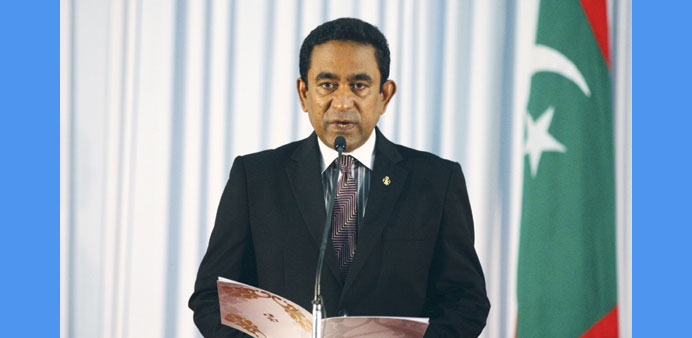President Abdulla Yameen: “We are disappointed that some countries, and indeed some prominent bodies within these countries, have seen it fit to interfere in domestic affairs in the Maldives.”
AFP/Colombo
Maldives President Abdulla Yameen has lashed out at perceived foreign interference in the honeymoon island’s affairs, following Western pressure over the controversial conviction of former president Mohamed Nasheed for terrorism.
In an address late Sunday to mark the Indian Ocean nation’s 50th anniversary of independence from Britain, Yameen accused developed countries of imposing their own legal and moral standards on the atoll.
“We are disappointed that some countries, and indeed some prominent bodies within these countries, have seen it fit to interfere in domestic affairs in the Maldives,” Yameen said at the event in the island capital Male, attended by neighbouring Sri Lankan President Maithripala Sirisena.
They have questioned the Maldives’ “judicial independence and integrity” and condemned it for not supporting “ideologies that are entirely alien to our culture, our faith and our traditions”, he said.
Yameen vowed to resist threats from “outside” which were far more dangerous than those from within, according to a translation of his speech released by his office yesterday.
The remarks were seen partly as a reference to the 53-member Commonwealth, which has criticised the Maldives over its crackdown on dissidents and its controversial judiciary.
Yameen has already asked parliament to consider if the Maldives should leave the Commonwealth, a major development partner.
The image of the Maldives as an upmarket tourist destination has been tarnished in recent years by political unrest — including the jailing of Nasheed in March, less than a month after his arrest in February.
The government said on Friday its prosecutor-general would appeal against Nasheed’s conviction, and confirmed that his 13-year jail sentence had been commuted to house arrest.
Supporters of Nasheed, the first democratically-elected leader before being toppled in 2012, have maintained that he was convicted as part of a strategy by Yameen’s regime to silence him.
Washington warned in May that democracy was under threat, saying Nasheed had been “imprisoned without due process”.
Despite his condemnation of Western nations, Yameen said he was seeking foreign investment to strengthen the economy.
Last Thursday he approved a new law allowing foreign ownership of land in the Maldives for the first time.
Opposition MPs expressed fears the move could clear the way for China to set up bases in the islands, which straddle east-west shipping routes.
The newly appointed vice-president, Ahmed Adeeb, rejected their concerns, saying the move was merely aimed at attracting foreign investment in the same way as Dubai, Singapore and Saudi Arabia had done with special zones.
“Our sovereignty is not on offer,” Deeb told The Hindu, an Indian newspaper, adding: “We don’t want to give any of our neighbours, including India … any cause for concern. We don’t want to be in a position when we become a threat to our neighbours.”
The Maldives has been troubled by gang violence, a rise in religious extremism and drug abuse - though most tourists remain oblivious to the problems in the nation of 330,000 Sunni Muslims. It has also suffered almost continual political unrest.
Since Nasheed was jailed for 13 years in March there have been regular protests on Male’s streets.
Loyalists have argued that the detention of the human rights activist turned politician is an attempt to shut down opposition to the government of Yameen.
David Cameron called last month for “political dialogue (and the) release of Nasheed and all political prisoners” in the Maldives.

